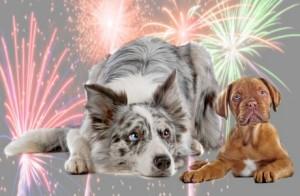
Early July is rife with fireworks displays here in South Jersey. Whether you live in Hammonton, Sicklerville, Turnersville, Atco, Berlin, Sewell, Marlton, Voorhees, or any of the other towns in our area, you’re not far from a 4th of July celebration complete with loud noises, bright lights, and strange smells. It can be difficult for dogs. As startling as an unexpected explosion can be for a human, for pets, they can be downright terrifying. Here are some things you should know about fireworks as a pet owner:
Fear of fireworks is normal
Some pets behave anxiously in response to fireworks. Humans can expect to hear them around the fourth of July in the United States, but pets cannot understand dates and holidays and when to expect fireworks.
A dog’s sensory experiences are more intense
We humans have dogs beat when it comes to detecting and differentiating between colors. In almost every other way, though, dogs’ senses are more acute than ours. Dogs can hear pitches that are outside the range of what hearing people are able to detect. Since a dog’s sensory experiences are more intense, fireworks are understandably frightening.
The Fight-or-Flight response is involuntary
Animals are pre-wired to respond to danger. The “fight-or-flight response” (sometimes called the “fight-flight-or-freeze response”) causes a rush of adrenaline and stress hormones, an increase in heart rate, hyper-vigilance, and behavior changes to match. Some pets may bark, hide, run, and some may be frozen in fear. When this pre-wired response kicks in, even dogs who are housebroken may suddenly have unwanted behaviors they do not normally display. Try to reassure and calm your dog to lessen this response.
Fireworks may be more intimidating than thunderstorms
Some pets are terrified of thunderstorms, while others are completely unbothered. The barometric pressure changes and cloudiness can provide clues of an impending storm, allowing your pet to anticipate thunder. Fireworks have no such warning signs, which could be disorienting and frightening for your pet.
Dogs can be desensitized to the noise
Classical Conditioning efforts may help to reduce the stress of fireworks, but this process can take months, and not all dogs will be equally responsive. Play recorded fireworks sounds for your pet at a very low volume and reinforce calm behavior with praise or treats. Gradually increase the volume of the recording from session to session so that the fireworks are not intimidating and your pet becomes accustomed to behaving appropriately in the presence of fireworks sounds. You might even condition your dog to salivate at the sound of fireworks!
Create a calm space away from the noise
Pets may have different spaces they feel safe in. A crate-trained pet may feel safest in their crate with a chew toy. Others may feel safer in a bed. Treats and toys may be able to provide a positive association with fireworks. Gentle music may provide a calming distraction. It’s also critical that everyone in the house remain calm around the pet.
If your pet’s response is extreme, talk to your veterinarian
Everyone gets nervous, even pets. If your pet’s reaction is more extreme and destructive, you should talk to your veterinarian about it. Bring your pet to our animal hospital to see if they need anti-anxiety medication in conjunction with the above steps.



